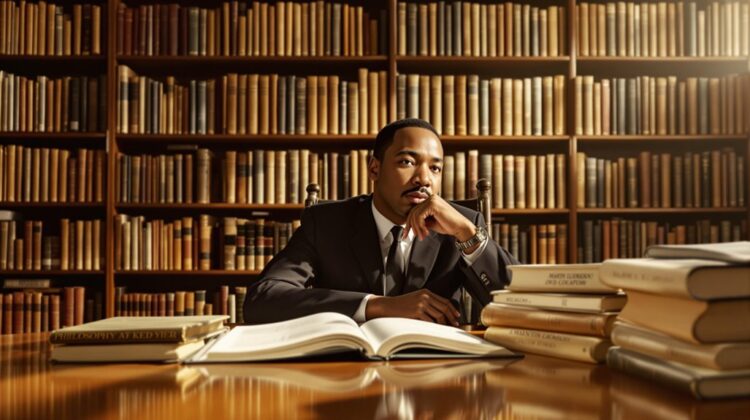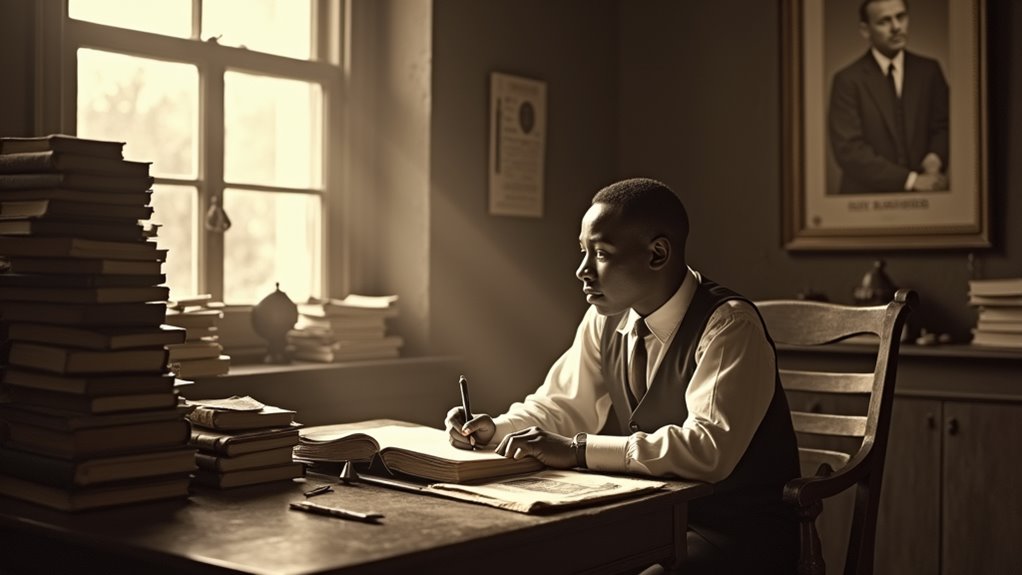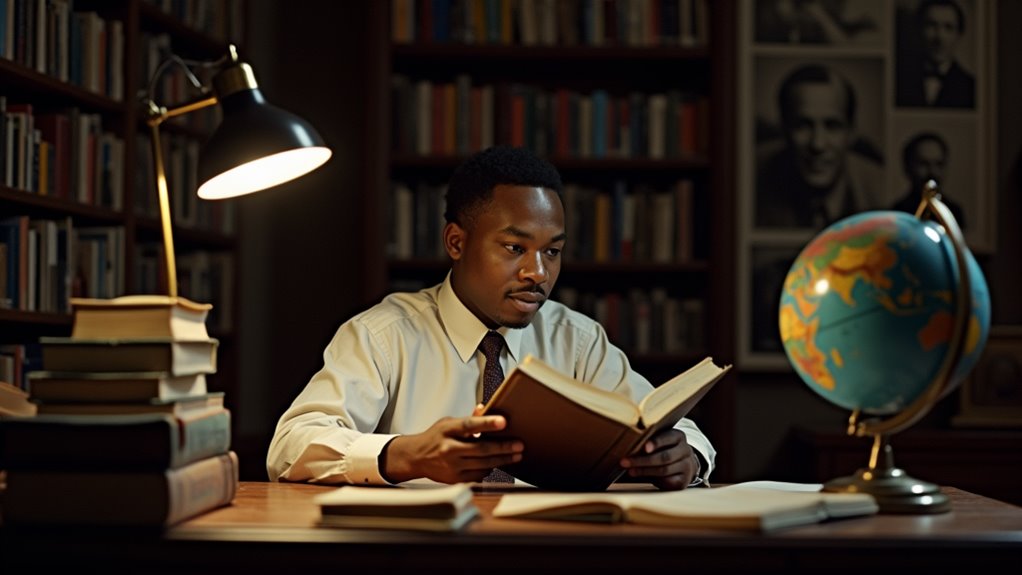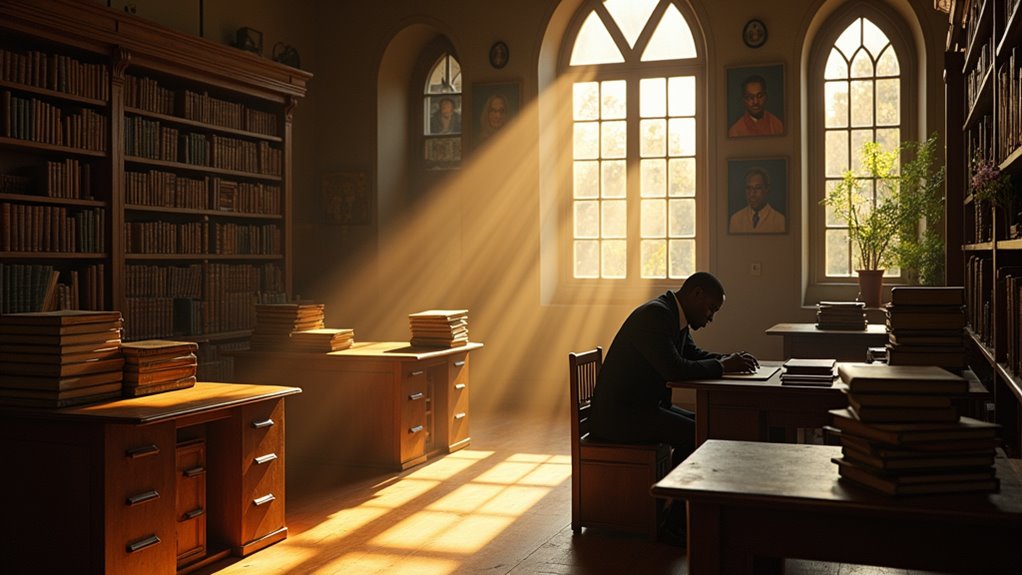
Martin Luther King Jr. was deeply influenced by his educational path. He attended Morehouse College, where he was inspired by Benjamin E. Mays, who emphasized social change. King then studied at Crozer Theological Seminary, honing his oratorical skills and commitment to nonviolence. His doctoral studies at Boston University further shaped his theological perspective. King's marriage to Coretta Scott and early ministerial work in Montgomery solidified his dedication to civil rights, setting the stage for his lasting impact on social justice. Discover the pivotal events that followed.
Table Of Contents
Article Highlights
- Martin Luther King Jr. graduated from Morehouse College in 1948, influenced by President Benjamin E. Mays, who emphasized education as a tool for social change.
- At Crozer Theological Seminary, King became the first African American president of the student body and honed his commitment to social justice and nonviolence.
- King's doctoral studies at Boston University focused on integrating faith with social activism, culminating in a dissertation that shaped his theological perspective.
- Influenced by figures like Gandhi and A.J. Muste, King adopted pacifism and nonviolent resistance as central tenets of his civil rights activism.
- His philosophical engagements with theologians like Paul Tillich enriched his understanding of social inequities, empowering his advocacy for racial justice and equality.
Early Life and Family Background

Martin Luther King Jr.'s early life and family background were pivotal in shaping his character and values. Born as Michael King on January 15, 1929, in Atlanta, Georgia, he was raised in a deeply religious Baptist family with a lineage of ministers. His father, Reverend Michael King, and mother, Alberta Williams King, instilled in him principles of faith and social justice. Living with his maternal grandparents further solidified his moral foundation. Experiences during the Great Depression heightened his awareness of economic disparities faced by the black community, which would later inform his activism. Influenced by the African-American social gospel tradition, King emerged as a civil rights leader committed to nonviolent tactics, advocating for equality and justice throughout his life. His education at Morehouse College provided him with a strong intellectual foundation that fueled his commitment to civil rights.
Education at Morehouse College
Though he entered Morehouse College at the young age of 15, King quickly distinguished himself as a dedicated student enthusiastic to engage with the pressing social issues of his time. Graduating with a bachelor's degree in sociology in 1948, he was profoundly influenced by President Benjamin E. Mays, who championed social action within the African American community. Initially contemplating careers in law or medicine, King ultimately felt a calling to the ministry, drawing inspiration from the African-American social gospel tradition. His experience at Morehouse allowed him to hone his leadership and oratory skills, exemplified when he delivered his first public sermon at just 17 years old and became an assistant pastor at Ebenezer Baptist Church, further solidifying his commitment to social justice. True education must combine intelligence with character, a principle that King carried throughout his life and work.
The Influence of Benjamin E. Mays

Benjamin E. Mays considerably shaped Martin Luther King Jr.'s educational path and philosophical outlook during his time at Morehouse College. Mays emphasized the necessity of social justice, urging King to view education as a means for enacting change rather than merely a route to personal success. His mentorship laid the groundwork for King's active engagement in the civil rights movement and his commitment to nonviolent resistance. Mays's influence is evident in King's commitment to nonviolent resistance, which became a cornerstone of his approach to achieving racial equality.
Mays' Role in Education
The educational path of Martin Luther King Jr. was considerably shaped by the influence of Benjamin E. Mays, who served as president of Morehouse College during King's tenure. Mays emphasized the importance of education as a tool for social action, urging King and his peers to engage in the fight for racial justice. Mays' mentorship nurtured King's comprehension of non-violent resistance, which later became central to his activism. He encouraged King to look beyond spiritual matters, instilling a sense of responsibility to confront societal issues. Mays' teachings laid the groundwork for King's belief in the transformative strength of knowledge and collective action, finally guiding his decision to pursue a career dedicated to ministry and social change.
Philosophy of Social Justice
Social justice emerged as a pivotal theme in Martin Luther King Jr.'s philosophy, heavily influenced by the teachings of Benjamin E. Mays. Mays instilled in King the importance of addressing contemporary social issues, particularly within the Black church, which helped shape King's commitment to activism and equality. He introduced King to the concepts of nonviolent resistance and social reform, which became foundational in King's strategies for civil rights. The mentor-mentee relationship between Mays and King nurtured significant intellectual growth, leading to key beliefs in:
- The integration of faith and activism
- The need for immediate social justice action
- Nonviolent approaches to civil disobedience
- The pursuit of racial equality and justice
Mays' influence was instrumental in shaping King's vision for a just society.
Impact on King's Activism
During his education at Morehouse College, Martin Luther King Jr. was profoundly shaped by the mentorship of Benjamin E. Mays. Mays instilled in King a deep commitment to social justice, urging him to leverage education as a transformative tool for societal change. He emphasized the importance of confronting contemporary social issues, guiding King to see the church's role in advocating for civil rights. Mays introduced King to the principles of nonviolent resistance, which became fundamental to his activism. Mays' own experiences as an African American leader provided a model of moral courage and effective leadership. Under Mays' guidance, King refined his oratorical skills, finally emerging as a prominent voice in the Civil Rights Movement and a national leader for racial equality.
Theological Studies at Crozer Theological Seminary

Martin Luther King Jr.'s time at Crozer Theological Seminary from 1948 to 1951 marked a pivotal period in his academic and activist path. Graduating at the top of his class and serving as the first African American president of the student body, King demonstrated notable academic excellence and leadership. His exposure to influential thinkers and philosophies during this period laid the foundation for his commitment to social justice and nonviolent activism.
Academic Excellence Achievements
In spite of he faced the challenges of attending a largely white institution, King excelled academically at Crozer Theological Seminary, where he earned a Bachelor of Divinity degree from 1948 to 1951, graduating at the top of his class. His time at Crozer was marked by significant achievements that highlighted his academic excellence and leadership abilities:
- Elected as the first African American president of the student body.
- Developed a commitment to social justice through exposure to diverse philosophical ideas.
- Embraced nonviolence as a core principle, influenced by Gandhi and Muste.
- Refined his oratorical skills, which became pivotal in his future civil rights activism.
These accomplishments laid the foundation for King's profound impact on the civil rights movement.
Influences on Social Activism
The academic path at Crozer Theological Seminary profoundly shaped King's approach to social activism. As the first African American student body president, King demonstrated exceptional leadership in a mainly white institution. His exposure to Mahatma Gandhi's philosophy of nonviolence during this time greatly influenced his strategies for civil rights and social activism. Graduating at the top of his class in 1951, King solidified his commitment to integrating faith with action for social justice. His studies encompassed a range of philosophical ideas, from Plato to Hegel, nurturing his neo-orthodox theology. This theological evolution emphasized the necessity of social activism within the African American community, ultimately guiding King's lifelong dedication to the civil rights movement and the pursuit of equality.
Doctoral Studies at Boston University
Enrolling in Boston University for doctoral studies marked a significant step in King's academic path, following his completion of a Bachelor of Divinity degree at Crozer Theological Seminary. His time at Boston University was pivotal in shaping his theological perspective and commitment to social justice. Key aspects of his doctoral studies included:
- Completion of a dissertation on the theology of Paul Tillich and Henry Nelson Wieman.
- Graduation in 1955 as one of the youngest individuals to earn a Ph.D. in theology.
- Integration of personalism and the sanctity of human personality into his later rhetoric.
- Exposure to diverse philosophical influences that enriched his civil rights activism.
These experiences laid the groundwork for King's future work in social justice.
Marriage and Personal Life
Marriage marked a pivotal chapter in Martin Luther King Jr.'s life, intertwining his personal and professional paths. He married Coretta Scott on June 18, 1953, after meeting her at Boston University. Initially hesitant about marrying a minister, Coretta evolved into an indispensable partner in King's civil rights activism. Together, they raised four children—Yolanda, Martin III, Dexter, and Bernice—in an environment steeped in the pursuit of social justice. Coretta actively participated in demonstrations and shared King's vision for equality and peace. Following King's assassination in 1968, she continued his legacy, establishing the Martin Luther King Jr. Center for Nonviolent Social Change in Atlanta, ensuring their family's commitment to civil rights and social justice endured beyond his life. Their relationship was built on a shared commitment to social change, which fueled their activism.
Early Career and Ministerial Work
Following his marriage to Coretta Scott, Martin Luther King Jr. commenced on a significant expedition as a pastor and civil rights leader. In 1954, he accepted the pastorate at Dexter Avenue Baptist Church in Montgomery, Alabama, where his commitment to civil rights deepened following Rosa Parks' arrest. King became a central figure in the Montgomery bus boycott, advocating for nonviolent protest influenced by Gandhi.
Key aspects of his early career include:
- Co-founding the Southern Christian Leadership Conference (SCLC) in 1957 to unify civil rights efforts.
- Promoting black voting rights as a fundamental goal of the movement.
- Publishing "Stride Toward Freedom: The Montgomery Story" to share his experiences.
- Building alliances with labor unions and peace groups to strengthen the cause.
King's leadership was instrumental in galvanizing public support for civil rights and laid the foundation for the Civil Rights Act of 1964, which aimed to end discrimination and promote equality.
Key Influences on Civil Rights Activism
Throughout his educational path, Martin Luther King Jr. was greatly influenced by key figures and ideas that shaped his approach to civil rights activism. His time at Morehouse College, under the mentorship of Benjamin E. Mays, instilled a strong commitment to social justice and activism within the African American community. At Crozer Theological Seminary, King engaged with the philosophy of nonviolence from Mahatma Gandhi and pacifist ideas from A.J. Muste, which became central to his civil rights approach. His theological studies improved his comprehension of social inequities, motivated by early experiences with racial discrimination. Further refining his perspectives at Boston University, King emphasized personalism and the sanctity of human personality, integrating these principles into his advocacy for racial justice through nonviolent means.
Frequently Asked Questions
What Was Martin Luther King Jr's Education?
Education plays an essential role in shaping an individual's worldview. In this case, higher education provided a foundation for critical thinking and public speaking. Early influences from mentors and a strong religious upbringing nurtured a commitment to social justice. Academic achievements included a bachelor's degree in sociology, a Bachelor of Divinity, and a Ph.D. in systematic theology. These experiences equipped him with the tools necessary to advocate effectively for equality and justice.
What Was Martin Luther King Jr Influences?
Influenced by a rich fabric of personal experiences, Martin Luther King Jr. drew from his strong religious background, family support, and the prevailing political climate. His advocacy for civil rights was shaped by literary influences, including Thoreau's "Civil Disobedience." These elements converged to inspire his commitment to nonviolent protest. King's activism was further enriched by the moral teachings of his forebears, guiding him in the direction of a vision of justice rooted in love and humanity.
What Teaching Influenced Martin Luther King Jr?
The teachings that influenced him encompassed a blend of social justice principles, nonviolent resistance, and civil disobedience. Religious teachings provided a moral foundation, whereas philosophical influences, including the works of thinkers like Gandhi, shaped his approach to ethical leadership. His strong oratory skills were honed through early experiences, allowing him to articulate the struggles for civil rights effectively. Together, these elements cultivated a profound commitment to advocating for equality and justice.
How Old Was MLK When He Went to College?
At the age of 15, he began his college path, demonstrating remarkable academic abilities during his early education. This early start marked a notable milestone in his academic path, showcasing a commitment to higher learning. His college experience at Morehouse College culminated in a Bachelor's degree by age 19. These age milestones in student life laid the foundation for his future endeavors in social justice and activism, greatly shaping his perspectives.

Leave a Reply